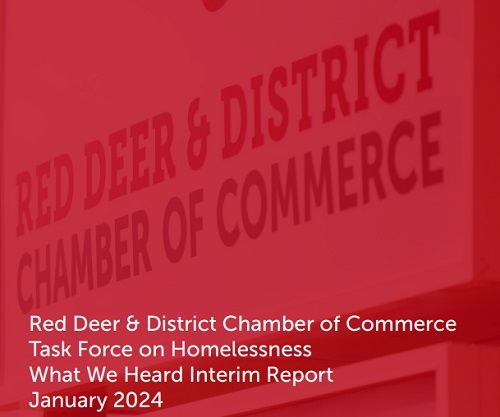City of Red Deer
Homelessness Task Force release interim report – Looking for your feedback

Red Deer & District Chamber of Commerce Task Force on Homelessness Release Interim “What We Heard” Report
Following eight months of comprehensive research, reviews of best practices, targeted interviews, and community conversations, the Red Deer & District Chamber of Commerce (the Chamber) Task Force on Homelessness is pleased to announce the release of its interim “What We Heard” report.
“As we share this interim report, we extend our sincere gratitude to all those who engaged with us throughout our research phase,” said Lyn Radford, Task Force Chair. “The perspectives shared with us have been instrumental in shaping our understanding of the complex issue of homelessness in Red Deer and informing our interim report.”
Since May 2023, the Chamber’s Task Force has prioritized listening and learning from various organizations and individuals to better understand the homelessness situation in Red Deer.
The Task Force:
• reviewed studies, municipal approaches, and news articles regarding best practices in addressing homelessness in Alberta and across North America;
• toured 17 agencies and facilities providing support for individuals experiencing homelessness in Calgary, Edmonton, and Red Deer;
• conducted 12 targeted interviews with government officials, social sector agencies, and community members who are experienced in social services or connected to homelessness initiatives; and
• hosted two community conversations to learn and hear from the social sector and Chamber Members on their perspectives and experiences regarding homelessness in Red Deer, with 47 individuals participating in these conversations.
The interim report outlines the Task Forces’ understanding of the homelessness situation in Red Deer and provides a summary of what has been learned during the research phase.
“Assessing the data and research gathered through our business lens, the Task Force has identified six key overarching themes that contribute to homelessness in Red Deer and are areas where the business community can actively contribute to address the issue and advocate for meaningful change,” says Scott Robinson, Chief Executive Officer of the Chamber. “We invite Red Deerians to review the report and provide their feedback on our findings by February 16, 2024. Your feedback is crucial in guiding our next steps as we strive to develop recommendations that are sound, relevant, and responsible. Together, we can make a meaningful difference in addressing homelessness in Red Deer.”
The interim report and feedback form may be viewed at:
https://www.reddeerchamber.com/homeless-task-force/.
The feedback form is at this link.
From the Homeless Task Force Report
A CASE FOR ACTION
During the City of Red Deer’s 2022 Point in Time Homeless count, 334 individuals were identified
as experiencing homelessness, more than double the 144 individuals identified as experiencing
homelessness in 2018.
Homelessness has a ripple effect throughout the community. Not only are the hundreds of Red
Deerians experiencing homelessness not being adequately supported in our community, but
homelessness impacts health and social services resources, crime and safety, and the reputation
and economic viability of Red Deer.
Recognizing the growing impacts of homelessness throughout Red Deer, the Red Deer & District
Chamber of Commerce (the Chamber) formed a volunteer Task Force of business leaders to
understand the homelessness situation in Red Deer better and identify specific areas where the
business community can actively contribute to addressing the issue and advocate for meaningful
change.
This interim report outlines the Task Force’s understanding of the homelessness situation in Red
Deer and summarizes what the Task Force learned during the research phase.
In the spring of 2024, the Task Force will deliver a final report using these findings to create a set of actionable recommendations for the community to consider.
2022 POINT IN TIME HOMELESSNESS COUNT
In 2022, the seven Albertan cities listed below coordinated point in time homelessness counts to create an understanding of homelessness across the province. While the cities coordinated their efforts, unique community trails and approaches impact the ability to make direct comparisons between the cities and results. Below, the number of individuals identified as experiencing homelessness and the city’s population are listed.
Calgary 2,782
Population: 1,413,8000
Edmonton 2,519
Population: 1,087,803
Grande Prairie 328
Population: 67,699
Lethbridge 454
Population: 104,254
Medicine Hat 70
Population: 65,949
Red Deer 334
Population: 105,883
Wood Buffalo 162
Population: 74,532
Source: Homeless Hub Community Profiles
KEY THEMES
Assessing the data and research gathered through our business lens, the Task Force has identified six key overarching themes that contribute to homelessness in Red Deer and are areas where the business community can actively contribute knowledge, experience, or resources to address the issue and advocate for meaningful change.
The overarching themes are:
1. Housing is a business and economic development issue
2. Community understanding of homelessness
3. It’s hard to go home when there is no home to go to
4. Collaborative fragmentation
5. Bureaucratization of homelessness
6. Conflicting civic priorities
City of Red Deer
City of Red Deer Employee Honoured with Bob Stollings Memorial Award for Outstanding Contributions

Annette Scheper, Community & Program Facilitator in the Safe & Healthy Communities Department is The City’s 2025 recipient of the Bob Stollings Memorial Award.
The Bob Stollings Memorial Award is given out each year to a City employee who displays outstanding performance in alignment with The City’s RISE cornerstone values – respect, integrity, service and excellence. Nominations for the award are submitted by fellow coworkers detailing the employee’s achievements professionally and interpersonally, along with letters of support. The award is considered a great honour among City staff.
With an impressive 22-year career, Annette has played a pivotal role in shaping Red Deer’s cultural and special events landscape. Her leadership and innovation have brought thousands of successful events to life, creating lasting traditions that enrich the lives of residents. Her commitment to excellence and resourcefulness has ensured that community initiatives are inclusive, accessible, and impactful.
One of Annette’s most notable achievements is the development of the Community Loan Program, which provides essential resources for local groups, contributing an annual value of $86,778.95 back into the community. In addition, she has successfully led and executed a variety of large-scale events, demonstrating remarkable problem-solving skills and a dedication to sustainability. From creating elaborate event designs with repurposed materials to managing complex logistics, she continuously sets the standard for excellence.
“Annette exemplifies the best of our organization,” said City Manager, Tara Lodewyk. “Her unwavering dedication, innovative thinking, and ability to bring people together has made a profound impact on our city. This award is a testament to her hard work and passion for creating meaningful experiences for our community.”
The Bob Stollings Memorial Award was first established in 1985 and is presented every year to honour Robert (Bob) E. Stollings, a loyal and dedicated City employee from 1960-1984.
City of Red Deer
Red Deer will choose a new Mayor as Ken Johnston decides to step away

It’s a telling detail about the person who leads Red Deer City Council. Always putting the city’s needs ahead of his own, Mayor Ken Johnston has announced his intentions within days of the opening of Nominations for October’s municipal elections,
After 12 years on council, Mayor Ken Johnston has decided against running for a second term as Mayor this fall. Johnson shared his decision in front of colleagues and supporters in a touching announcement on Wednesday.
At 71 years old, Johnston remains vibrant, passionate and healthy. He says that’s exactly why he and his wife Carolyn have decided now is the right time to start their next stage of life together.
Mayor Johnston listed a number of highlights and achievements he can look back on, including his help advocating for the redevelopment of Red Deer Regional Hospital, the growth of Red Deer Polytechnic, and positive moves in Economic Development.
All these lead of a feeling of ease about the decision to step away, though affordable housing and a permanent shelter for the homeless remain pressing concerns.
With about 8 months remaining in his term, Mayor Johnston is planning to push hard to move the needle on these housing issues.
“We’re looking forward to some more work and we’ll be going to the community shortly about it. So I still have optimism that maybe before the term is out we can have an announcement.”
This is the second major political announcement in Central Alberta in the last number of days. Earlier this week Red Deer Mountain View MP Earl Dreeshen announced he won’t be running in the next federal election.
-

 Business2 days ago
Business2 days agoTrump: China’s tariffs to “come down substantially” after negotiations with Xi
-

 Business2 days ago
Business2 days agoTrump considers $5K bonus for moms to increase birthrate
-

 2025 Federal Election2 days ago
2025 Federal Election2 days agoPolice Associations Endorse Conservatives. Poilievre Will Shut Down Tent Cities
-

 Business1 day ago
Business1 day agoChinese firm unveils palm-based biometric ID payments, sparking fresh privacy concerns
-

 2025 Federal Election2 days ago
2025 Federal Election2 days agoCanada’s press tries to turn the gender debate into a non-issue, pretend it’s not happening
-

 COVID-192 days ago
COVID-192 days agoRFK Jr. Launches Long-Awaited Offensive Against COVID-19 mRNA Shots
-

 2025 Federal Election2 days ago
2025 Federal Election2 days agoNext federal government should end corporate welfare for forced EV transition
-

 2025 Federal Election19 hours ago
2025 Federal Election19 hours agoCarney’s Hidden Climate Finance Agenda





